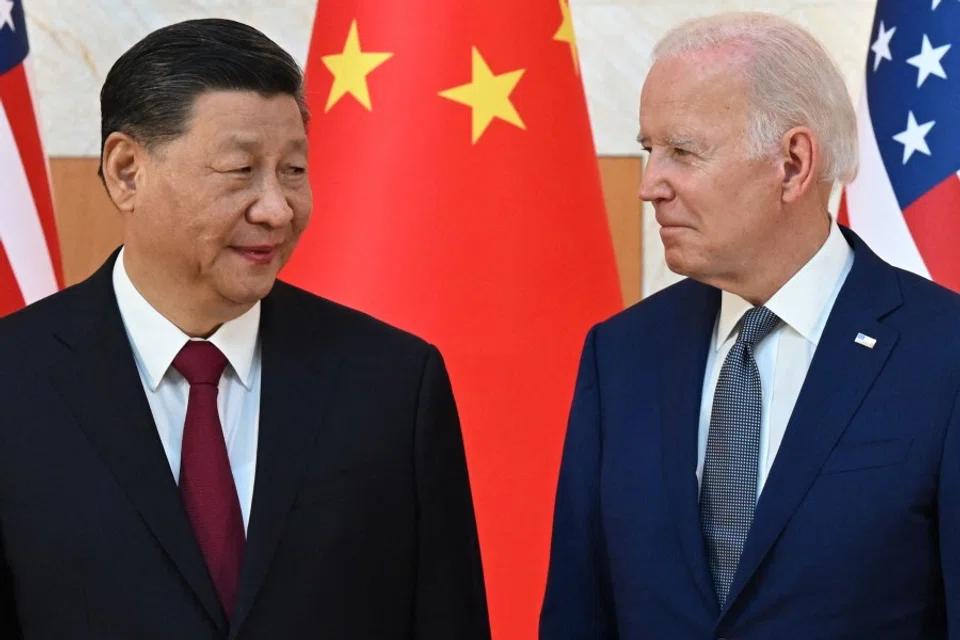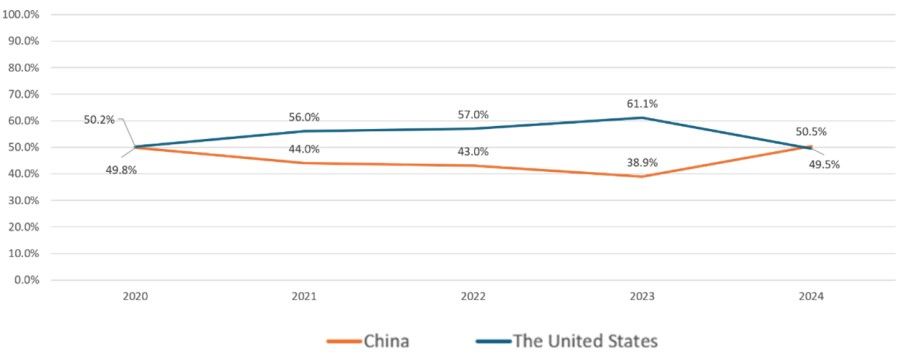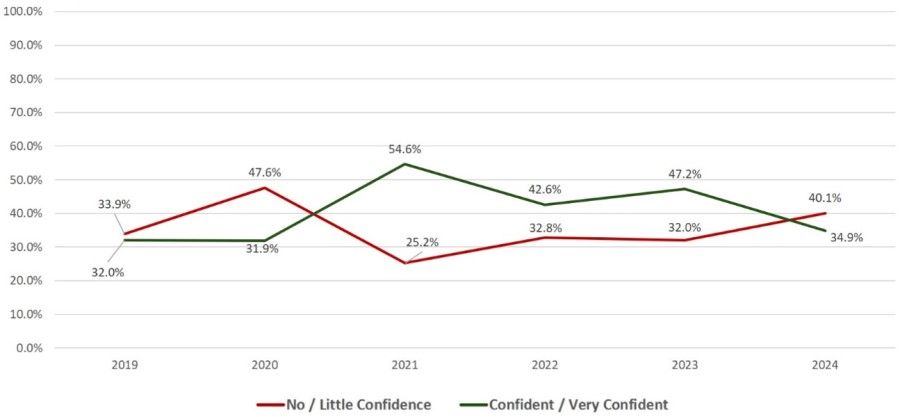State of Southeast Asia Survey 2024: Choosing China over the US is neither a tidal shift nor a sea change

When confronted with a hypothetical question of which strategic partner to align with, Southeast Asian opinion leaders chose the US during the Biden administration's first three years. This year, the region's sentiments have shifted ever so perceptibly towards China.
For the first time since 2020, when The State of Southeast Asia polled this question, China has edged past the US: 50.5% of respondents in the regionwide survey's just-completed 2024 round say that ASEAN should align with China instead of the US, a steep increase from 38.9% in 2023. With the exception of the Philippines, Singapore and Vietnam, the other seven ASEAN countries would rather pick China over the US. Even American treaty ally Thailand would do the same. These sentiments are strongest in Laos, Malaysia and Indonesia.
Only the Philippines and Vietnam, the two front-line South China Sea (SCS) claimant states, maintained high confidence levels in the US's security umbrella.
US loses edge in security
Confidence in the US as a reliable security provider also plummeted quite drastically despite the Biden administration's security engagement with regional countries in 2024. Only 34.9% of regional respondents say the US is a reliable security partner, a sharp drop from 47.2% last year. Conversely, those who are not confident in the US's security role increased from 32.0% to 40.1%. According to data published by the Lowy Institute, the US participated in 33% of the 525 recorded joint military exercises with Southeast Asian states, whether bilaterally or multilaterally, from 2021 to 2023. Regional thought leaders' regard for the US's geopolitical presence appears to be the poorest in Indonesia, where 60.7% of survey respondents say they have no or little confidence in the US's security role, followed by Brunei (58.5%) and Malaysia (52.5%). This is despite all of them engaging in more joint military exercises with the US compared to China from 2021-2023, according to data from the Lowy Institute.

Only the Philippines and Vietnam, the two front-line South China Sea (SCS) claimant states, maintained high confidence levels in the US's security umbrella. The US and the Philippines updated their 1951 US-Philippines Mutual Defense Treaty and expanded their Enhanced Defense Cooperation Arrangements to include four new sites last year. The Marcos administration's posture towards the SCS has dramatically changed to what is called "assertive transparency policy" to shine a light on China's "grey zone tactics".
Vietnam upgraded its bilateral relations with the US to a Comprehensive Strategic Partnership in November 2023. Vietnam and the Philippines also entered into a new maritime cooperation agreement in January 2024 to manage potential SCS conflicts against China's growing aggression in the area although this should not be interpreted as any kind of unified strategy as both countries deploy different approaches to managing China.
For Southeast Asia, China may be an important economic partner, but China remains its greatest security concern...

Since the Biden administration took office in 2021, Southeast Asia has enjoyed a flurry of high-level visits to the region, the US president's participation at every ASEAN summit (until last year's summit) and other high-level international fora hosted by regional countries such as APEC and G20, and bilateral visits both to and from the White House to regional capitals.
The launch of the Indo-Pacific Economic Framework for Prosperity in 2022 was largely viewed in the region as an indicator of American political commitment to greater economic engagement. ASEAN leaders gathered at the White House for a special in-person summit in May 2022, and met President Biden to sign the Comprehensive Strategic Partnership later in November 2022, while celebrating the tenth anniversary of annual US-ASEAN summits. US congressional (CODEL) visits to the region were at an unprecedented high with at least ten CODELs in 2022-2023.
In fact, 2023 would arguably have been the peak of US engagement with ASEAN, with the House of Representatives passing the Providing Appropriate Recognition and Treatment Needed to Enhance Relations (PARTNER) with ASEAN Act, which designates ASEAN as an international organisation with diplomatic privileges and immunities - thus putting ASEAN on the same level as the EU and the African Union. Congress also passed a resolution supporting ASEAN centrality in the Indo-Pacific. ASEAN centrality is similarly underscored in the US National Security Strategy's pronouncement of the "centrality of ASEAN" and its pledge to expand regional diplomatic and economic engagement.
So, what gives? Why might the US's value proposition as a strategic and security partner be diminishing?
... the US is not seen as allaying regional security fears but, rather, as fanning the anti-China rhetoric through its actions.
ASEAN still clear-eyed about China
It would be easy to attribute all and sundry to China's rising influence in the region eating the US's lunch. But ASEAN countries are clear-eyed about China's role in the region. The majority of regional respondents still maintain a sense of unease and worry about China's economic (67.4%) and political and strategic influence (73.5%). The level of unease about China's political-strategic influence saw a five percentage point increase.
For Southeast Asia, China may be an important economic partner, but China remains its greatest security concern due to fears of its growing dominance domestically in their countries (38.5%), use of strong-arm tactics in potential theatres of conflict such as the SCS and the Mekong (37.2%), use of economic tools as punishment (35.0%) and interference in their countries' domestic affairs (33.5%).

In the same vein, the US is not seen as allaying regional security fears but, rather, as fanning the anti-China rhetoric through its actions. In many ways, when Beijing capitalises on the narrative of US provocation over hotspot issues such as the Taiwan Strait and SCS, it seems to resonate through the region especially when China cites that it has never started any wars or joined any conflict, or that China wants to maintain "peaceful coexistence" with the international community. In some quarters, the advent of the AUKUS arrangement and the Quad's containment rhetoric have not settled well. Indeed, reassurances of AUKUS and Quad coming from partners such as Australia and Japan, rather than the US, may carry more weight.
Among Southeast Asian respondents who say they don't trust the US to "do the right thing", nearly three in ten attribute the reason to the US being distracted with its internal affairs.
More push factors from the US
On the ongoing Israel-Hamas conflict, Southeast Asia may be willing to cut the US some slack, but its position may become increasingly untenable. Even if the Israel-Hamas conflict may be largely framed in religious terms due to the historicity of the issue in this region or as an extension of the counter-terrorism frame, the US position may be viewed as unconditional support for Israel. Some regional countries have an appreciation that states retain the right to respond to terrorist acts. Yet, others may view the conflict from a humanitarian lens, and hence, the US position may become indefensible over time.
On the economic front, the somewhat disappointing results coming from the Indo-Pacific Economic Framework for Prosperity (IPEF) negotiations may have also diminished hopes of closer engagement with the US, particularly in view of a potential change in Administration later this year which may yield some surprising actions or counter-actions to the IPEF's progress. The last administration has demonstrated to the region more clearly than ever that US domestic politics has a great propensity to influence foreign policy, and there is often little that other countries can do to mitigate these impacts. Among Southeast Asian respondents who say they don't trust the US to "do the right thing", nearly three in ten attribute the reason to the US being distracted with its internal affairs.
The US presidential elections later this year will be watched closely by Southeast Asians, with a sense of resignation toward the ramifications of superpower rivalry. Perhaps the tide of sentiment has shifted toward China as the more consequential relationship for the region, but it remains to be seen whether the recent trend of diminishing regard for the US's strategic partnership will mark a sea change in regional geopolitics.
This article was first published in Fulcrum, ISEAS - Yusof Ishak Institute's blogsite.
Related: State of Southeast Asia Survey 2023: Separate tangos with China and the US | State of Southeast Asia Survey 2023: Separate tangos with China and the US | Survey: China the most influential and distrusted power in Southeast Asia
